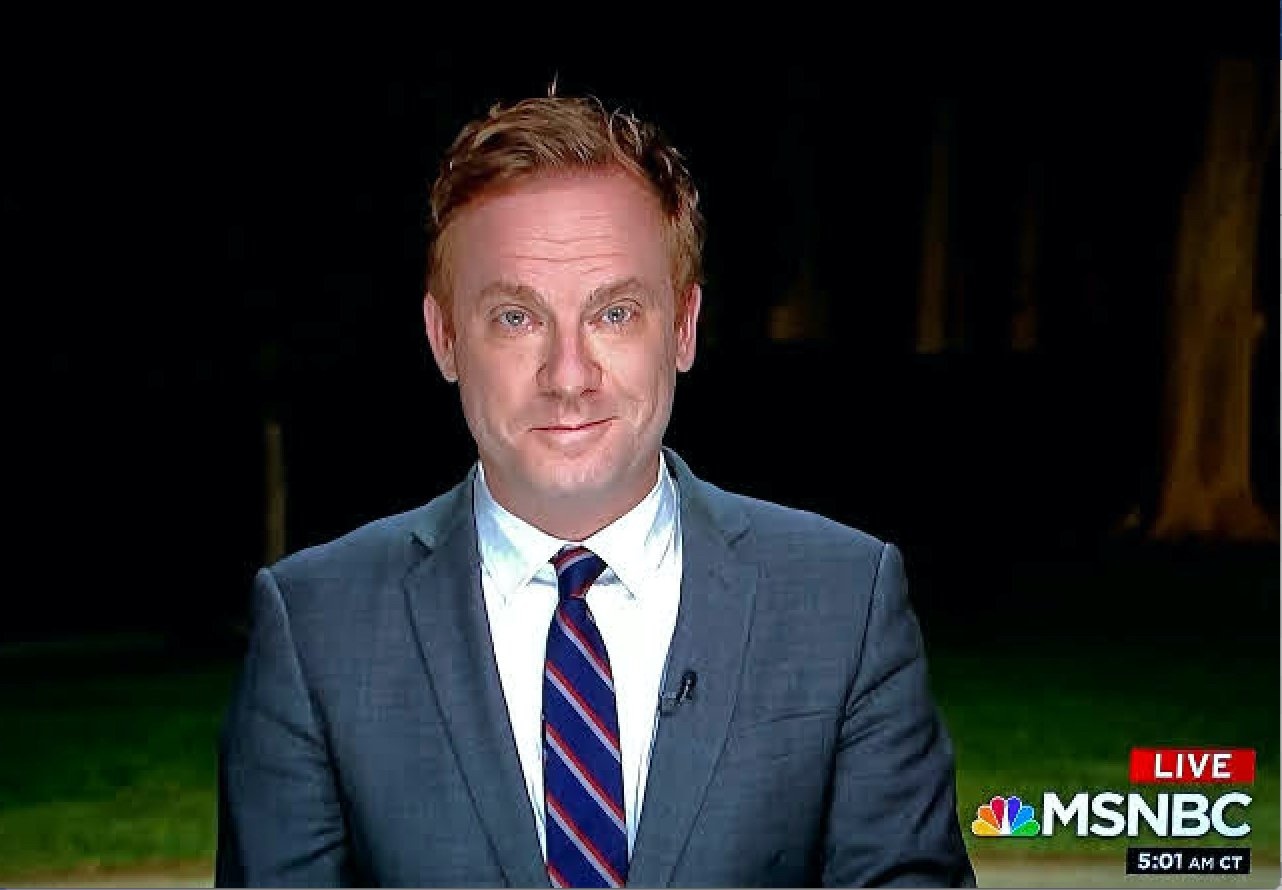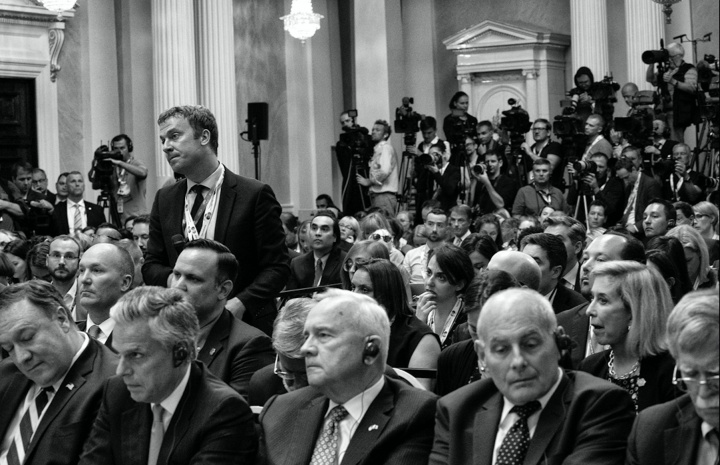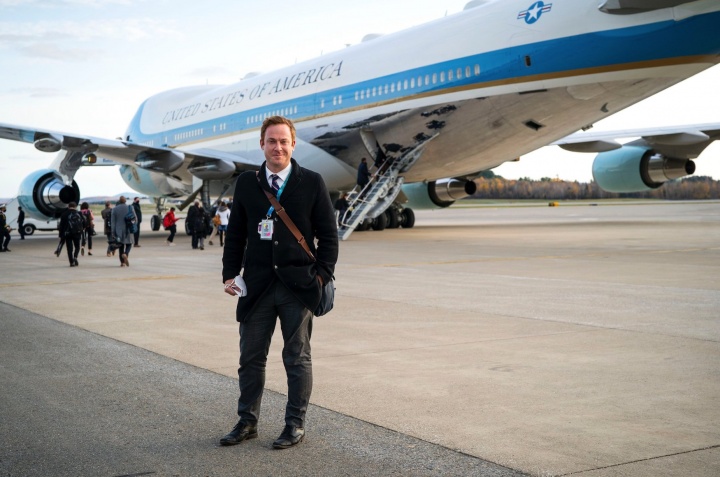Columbia College | Columbia University in the City of New York
Reporting on the Trump Presidency, by an AP Insider

Lemire reporting from the White House lawn on Morning Joe, June 2020.
Courtesy of Jonathan Lemire ’01
It wasn’t worth sending anyone from Washington.
A fading celebrity who had flirted with running for President several times but never followed through was teasing another announcement in Midtown Manhattan.
The odds of him going through with it were slim, and even if he did, what would it matter?
So, the editors at The Associated Press decided it didn’t merit dispatching a national correspondent, instead just tapping the local New York City political reporter to keep an eye on it. At most, the editors reasoned, it was worth a few hundred words.
And that’s how my journey with Donald Trump began.
I had a front-row seat — OK, more like third-row — when Trump came down the golden escalator in the skyscraper that bears his name and forever changed the course of American politics and how the United States is regarded around the globe.
There has never been a figure like him. He reshaped the office and shattered its centuries-old norms and traditions while dominating the national discourse like no one before.
He governed by whim and tweet, remodeling the Republican Party and giving birth to a new political movement. He deepened the nation’s racial and cultural divides and undermined faith in its institutions. He smashed conceptions about how Presidents behave and communicate, offering unvarnished thoughts and policy declarations alike, pulling back the curtain for the American people while enthralling supporters and unnerving foes — and sometimes allies — both at home and abroad.
His legacy: a tumultuous four years that were marked by impeachment, failures during the worst pandemic in a century and a stubborn refusal to accept defeat.
Covering it as part of the AP’s White House team has been an absolute privilege and an extraordinary challenge.
All Presidents complain about their media coverage, but no President before has made journalists such an intrinsic part of the narrative: “Fake News” became his go-to label for any story he didn’t like, a phrase that was soon appropriated by authoritarians elsewhere.
I have received dozens of death threats, one of which required FBI involvement to stop.
He called me a “sleazebag” in public and worse in private. He labeled the press “The Enemy of the People,” incendiary and dangerous language from the President of the United States, whose job is to protect all the amendments to the Constitution, including the First.

Lemire stands at the 2018 Russia-United States summit in Helsinki, July 2018.
Courtesy of Jonathan Lemire ’01
Some TV correspondents started traveling with security. At one particularly ugly rally in a packed Cincinnati arena, the Secret Service pulled the press pool — the group of reporters that always travel with the President, of which the AP is a permanent member — and moved us from our position near the stage to behind the SWAT team because they could not guarantee our safety.
The nation witnessed in early January, during the riotous siege of the U.S. Capitol, the dark forces unleashed by the President and the violence committed in his name. Reporters were put at risk that day; our health was also jeopardized every day we spent at the White House after it became the site of multiple Covid-19 outbreaks.
All of this became part of the job. And the job never felt more important. Or, well, exhausting.
The pace of news was relentless. This President didn’t have a set schedule, or a carefully considered legislative agenda or policy rollouts. This was a presidency by impulse, one informed by cable news chyrons and by Twitter, with tweets fired off in the pre-dawn hours that rattled Washington and acted as reporters’ alarm clocks.
One of the President’s former top advisors once told me that Trump didn’t just try to win that day’s news cycle; he wanted to win that news moment, and would do whatever it took to change the narrative to what he thought would be favorable to him or damaging to his foes.
No one’s coverage was perfect, mine included. But we did our best.
News organizations had to adjust. No longer could White House statements be assumed to be based in truth. Things that the President said could not be repeated verbatim without providing appropriate context and fact checking. The language of our coverage had to change, niceties dropped. When appropriate, we didn’t shy away from tough words like “lie” or “racist” or “insurrection.”
No one’s coverage was perfect, mine included. But we did our best.
It took some veteran White House correspondents years to find their footing covering the Trump administration because it drew no connection to any that had come before it. In some ways, those of us who had never covered the West Wing were better suited, since we came in the door with no preconceptions as to how things ought to be and we were used the frenetic pace of his campaign.
Plus, there was one more valuable training ground: the New York City tabloids.
Trump himself was a creation of the tabloids, using the front pages and gossip columns of the New York Daily News and the New York Post to create the persona of a celebrity developer long before he ventured into politics. He made himself a star, fueled by the papers’ insatiable around-the-clock drive for news in the most competitive and cutthroat media market in the nation.
It’s not a coincidence that a number of the most accomplished Trump reporters also came through the NYC tabloids; certainly, my decade-plus at the Daily News — a job I landed on the strength of clips from Spectator — helped prepare me for what was to come.
I had covered him briefly in New York. He even once tried to set me up on a date while I was on assignment. But despite that shared background, Trump doesn’t particularly care for me.
We clashed a few times during the 2016 campaign; it was my question to him about sexual assault after the release of the Access Hollywood tape that prompted him to call me a sleazebag and eject me from a small Florida event.
Other moments followed: a fervent viewer of cable news, he grew fixated on my appearances on MSNBC, and in particular Morning Joe, sometimes passing notes through the White House staff to comment upon things I had said on TV hours earlier. He resented the attention I received for asking him whom he believed about election interference — U.S. intelligence or Vladimir Putin — during his summit with the Russian president in Helsinki in summer 2018. And the next year he barred the press pool after I asked him a tough question during his Hanoi summit with North Korea’s Kim Jong Un.

Outside Air Force One; Bangor, Maine, October 2020.
Courtesy of Jonathan Lemire ’01
There was the private tour that Xi Jinping gave Trump of the Forbidden City in Beijing. The (admittedly weird) glowing orb that Trump, Egypt’s Abdel Fattah Al-Sisi and Saudi Arabia’s King Salman held in Riyadh. The motorcade ride through the West Bank toward Bethlehem. The raucous celebration in New Delhi. The wild trip to the DMZ. The helicopter ride over Omaha Beach. The day that began in Jerusalem and ended in Rome.
As the Biden presidency begins, I’ll continue in these roles, both as AP White House correspondent and MSNBC political analyst. It’s an administration facing an onslaught of challenges but it may tackle them in a more conventional, process-oriented fashion (and will likely — I hope — never make news by tweet).
But as I write this, with just 10 days left in Trump’s term, we don’t exactly know how his story draws to a close.
Trump has spent weeks refusing to accept the outcome of the election, peddling baseless conspiracy theories and inciting the recent violence at the U.S. Capitol. His Twitter account has been suspended, his circle of advisors shrinking by the day. He faces a second impeachment, yet his influence over most rank-and-file Republicans remains strong.
One thing seems clear: It is unlikely that he will go quietly; the tradition of ex-Presidents ceding the spotlight to their successor will almost certainly be another that Trump breaks. And when he does leave office, news organizations will once more have to grapple with a new moment — an ex-President who won’t leave the stage, wants to play GOP kingmaker and may very well run again.
It’s the end of his presidency but the political movement that began with that escalator ride is likely not over. And I’m sure I haven’t asked my last question of Donald Trump.
Jonathan Lemire ’01 is a White House reporter for The Associated Press and political analyst for MSNBC and NBC News. He also cares entirely too much about the Boston Red Sox.

